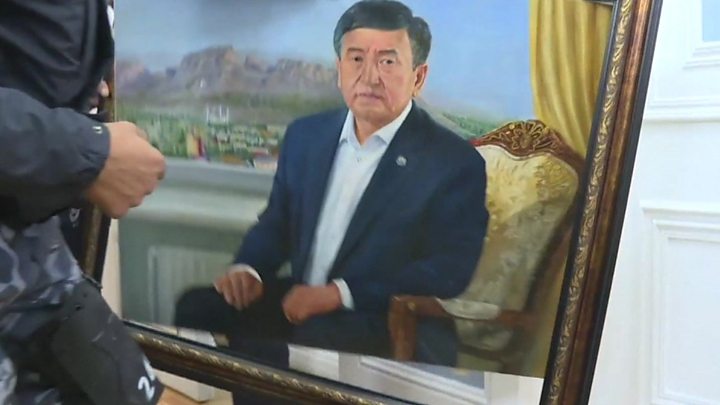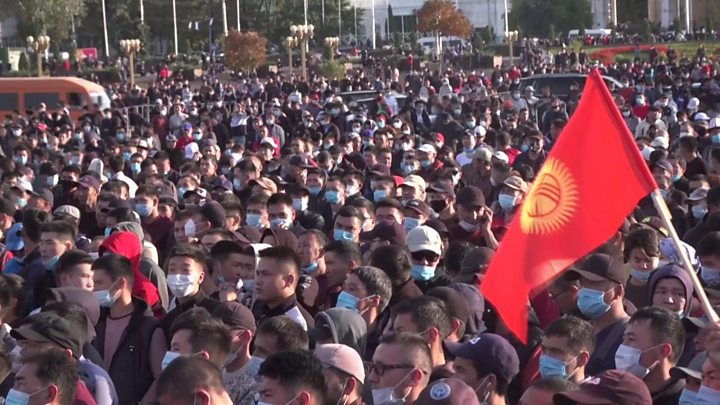
Media playback is unsupported on your device
The embattled president of Kyrgyzstan has hinted that he is ready to stand down following violent protests that have led to the annulment of Sunday’s election results.
Sooronbai Jeenbekov told the BBC he was “ready to give the responsibility to strong leaders”, although he refused to be drawn on who he had in mind.
Protesters gathered on Monday in anger over alleged vote-rigging.
Some then overran government buildings and stormed parliament.
By Tuesday morning, a number of high-profile political detainees had also been released, including former President Almazbek Atambayev, who was serving an 11-year sentence for corruption.
Only four political parties out of 16 passed the threshold for entry into parliament in Sunday’s election. Three of the four have close ties to President Jeenbekov.
The president had indicated he was ready to annul the result, before the official announcement came from the Central Election Commission which said it had invalidated the election results “in consideration of the political situation in the country”.
The BBC’s Almaz Tchoroev, in Bishkek, says the election will now be rerun but it is not yet clear when or how it will happen.
What did the president say?
“The main goal of the protestors was not to annul the election results but to remove me from power,” President Jeenbekov told BBC Kyrgyz in an exclusive phone interview from a secret hideaway.
He urged all parties to return to the “legitimate field” and work together to avoid the political upheavals of the past.
“To solve this issue, I am ready to give the responsibility to strong leaders, no matter which group they belong to. I am even ready to help them,” he added.
In an earlier video address earlier the president accused “certain political forces” of using the results of the election as a reason to “violate public order”. “They did not obey law-enforcers, beat up medical workers and damaged buildings”.
Observers say it appears that Mr Jeenbekov, who was elected in 2017, has lost all influence. But it is not clear who would replace him.
Opposition leaders have set up a Coordination Council but there are reports they are divided, arguing over who gets influential government positions.
How did the violence unfold?
Some 5,000 people gathered in the capital Bishkek’s Ala-Too square on Monday to demonstrate against the election results.
The protest was largely peaceful until the evening, when a smaller group splintered off and tried to break through the gates into the parliament building.

Media playback is unsupported on your device
The police then used water cannon, stun grenades and tear gas to try and clear the crowds from the main square and surrounding streets.
But demonstrators later flooded back into the central square before storming the parliament building, known as the White House.
Video footage shared on social media showed opposition protesters gaining access to the complex, some by climbing fences and others by pushing open the main gates. Later, smoke could be seen billowing out of the building.
The health ministry said nearly 700 people had been injured, with nine people in intensive care, and a 19-year-old man was killed.
What do we know about the election?
Out of 16 parties competing for the 120 seats at the Supreme Council, only four parties crossed the 7% barrier for election.
The two parties that each got a quarter of the vote, Birimdik and Mekenim Kyrgyzstan, both have close ties to President Jeenbekov.
None of the established opposition parties secured a seat at the parliament and on Monday all 12 opposition groups jointly declared they would not recognise the results of the vote.
They accused parties close to the president of vote-buying and voter intimidation – claims international monitors said were “credible” and a cause for “serious concern”.
Some observers claimed to have seen, during the first hours of voting, some citizens with marked masks being handed filled-out ballots. There were also allegations of voters being bribed and bussed in to places where they could swing the result.
Kyrgyzstan – five quick facts
- Second smallest of five Central Asian states, bordered by Kazakhstan, Uzbekistan, Tajikistan and China
- Was known as the Kara-Kirgiz Autonomous Region while part of the Soviet Union
- Acquired its present name after declaring independence in 1991
- Previous uprisings swept President Askar Akayev from power in 2005, and in 2010 ejected President Kurmanbek Bakiyev
- Has a reputation for holding semi-free and fair elections in comparison to its neighbours
Click Here to Visit Orignal Source of Article https://www.bbc.co.uk/news/world-asia-54432037


